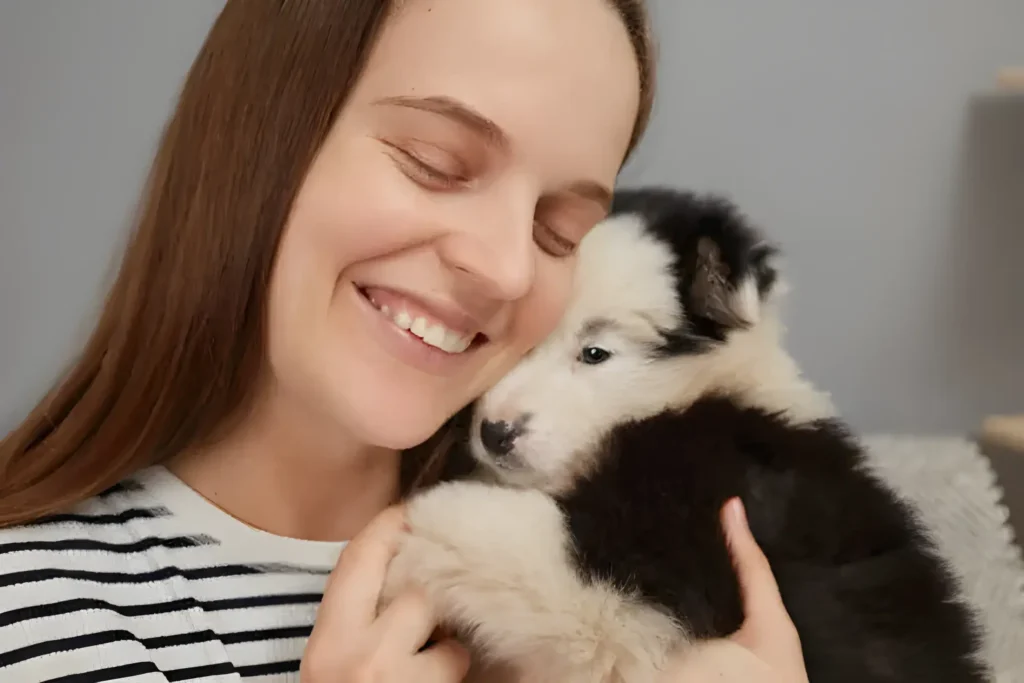The answer, honestly, is that it takes time and effort. But with patience and planning, you can find your groove with the newest, furriest member of your family. Don’t worry, your life isn’t over – it’s simply evolving.
The Puppy Blues: It’s Real, and You’re Not Alone
If you’re a few weeks into puppy parenthood and wondering if you’ve made a terrible mistake, you’re experiencing what many call the “puppy blues.” Those sleepless nights, relentless potty breaks, and chewed-up shoes can make you miss your old, predictable life. Know this: you’re not a bad pet parent for feeling this way!
When Things Start to Improve
The good news is that it gets easier. Here’s a rough timeline to keep in mind, but remember, every puppy is different:
The First Few Days: Survival mode! Focus on basic needs and establishing a routine.
A Few Weeks In: Things may feel harder as puppy energy ramps up. Accidents happen, and training is slow. Hang in there!
3-6 Months: Significant turning point! Potty training is reliable, basic commands are mastered, and the puppy has more independence. You’ll start having glimpses of your old life again.
6 Months +: Your bond deepens, and your pup is more of a companion than a whirlwind. While challenges may still arise, you’ve got this!
Tips for Finding Balance and Sanity
Crate Training is Your Friend: A crate offers a safe space for your puppy, making potty training easier and giving you necessary breaks.
Schedules are Everything: A predictable routine for both you and the pup creates structure and lessens anxiety all around.
Training is Key: Short, frequent training sessions teach your pup good manners and expend mental energy. A tired puppy is a well-behaved puppy!
Don’t Neglect Your Own Needs: Even 15 minutes to yourself for a walk, coffee, or just breathing deeply, makes a huge difference.
Seek Help: Dog walkers, daycare, or trainers can ease the load and speed up puppy progress.
Remember the Love: Why You Did This

In the tough moments, remember why you chose this furry chaos. The unconditional love, hilarious antics, and companionship will all be worth it. Focus on the joy your puppy brings, and take lots of photos – those puppy months fly by!
Beyond Puppy Survival: Building a Life You Love
Puppy-Proof Your Hobbies: Can you involve your pup in some things you enjoy? Hikes, dog-friendly patios, or scent-work classes turn puppy time into an enjoyable time for you too.
Small Wins Matter: Don’t wait for total perfection. Celebrate little victories like a walk without pulling on the leash, or an afternoon nap while your pup snoozes nearby.
Community Counts: Connect with other puppy parents for commiseration and support.
Success Stories: They’ve Been There Too!
“I felt like I could never leave the house! But crate training and a consistent schedule saved me. Now, Max loves his crate, and we have fun exploring dog parks on weekends.” – Liam, Labrador Retriever owner.
“The puppy blues hit me hard. But joining a puppy training class made a world of difference. The trainer’s advice was invaluable, and I met other puppy parents who understood the struggle.” – Noah, Beagle owner.
Conclusion
Raising a puppy reshapes your life, there’s no doubt about it. But it’s not about “getting your old life back.” Instead, it’s about welcoming a new furry member into your world and building a fulfilling life together. With patience, humor, and the right tools, you’ll navigate the puppy mayhem and come out the other side with an incredible best friend by your side.
The photo featured below the post headline is Credit: SementsovaLesia/istockphoto
I hope you find this post helpful and informative. If Yes’ feel free to share it with your friends!
Frequently Asked Question
Is it normal to cry during the puppy stage?
Absolutely! Hormonal shifts combined with exhaustion and overwhelm can lead to tears. Be kind to yourself.
When will I be able to leave my puppy alone?
This depends on age, breed, and training. Start with short absences and gradually increase the time.
Should I feel guilty about wanting my old life back?
Not at all! It’s a natural adjustment. Focus on building a new life that includes the joy your puppy brings.
Why am I sad after getting a puppy?
The “puppy blues” are very real. Adjusting to a little furball’s needs can be emotional and exhausting. Remember, it gets easier!
How long will I have puppy blues?
Each person (and pup!) is different, but most see improvement within the first few months as routines settle in. Don’t hesitate to seek support if you’re struggling.
How do I deal with my regret getting a puppy?
Be honest with yourself about what’s causing the regret. Is it exhaustion? Missing certain activities? Focus on practical solutions (dog walkers, finding puppy-friendly hangouts) and remember, it takes time to adjust.
How long does it take to feel bonded with my puppy?
Every relationship is unique. Some feel an instant connection, others build it over time. Shared experiences, training together, and plain old snuggles strengthen the bond.
Is it common to feel like I’m failing as a puppy parent?
Imposter syndrome is real, especially with a huge life change! Remember, no one’s perfect, puppies are resilient, and you’re learning every day.
How do I adjust my social life after getting a puppy?
It takes planning, but it’s possible! Look for dog-friendly outings, arrange puppy playdates, or utilize dog sitters when needed.
My puppy is driving me crazy with energy, what do I do?
Find healthy outlets! Age-appropriate exercise, puzzle toys for mental stimulation, and short training sessions can help channel that puppy power.
When will my puppy sleep through the night?
This depends on age and potty training progress. Many puppies sleep soundly by 4-6 months, but crate training is usually essential for overnight success.

